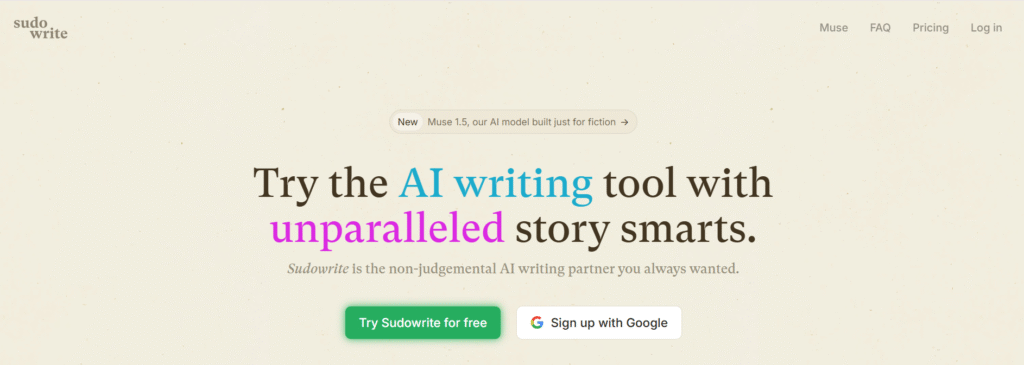The landscape of AI writing tools is evolving at lightning speed. This leaves many fiction authors wondering which platform offers the best features.
How can you find the right tool for crafting compelling stories in 2025?
Three major players that often dominate the conversation are ChatGPT, Sudowrite, and Jasper.
But how do they stack up specifically for the unique demands of fiction writing?
Choosing the right AI co-author can significantly impact your workflow. It affects everything from brainstorming and outlining to drafting and revising. Each tool brings its own strengths, weaknesses, and specific functionalities.
This in-depth comparison will break down ChatGPT, Sudowrite, and Jasper. It will help you decide which AI writing assistant fits your fiction needs this year.
I’ll explore core features, prose quality, and ease of use for creative tasks and will also cover pricing and specific benefits tailored to novelists.
Understanding the Contenders: A Quick Overview
Before diving deep, let’s briefly introduce our three AI writing tools:
- ChatGPT (GPT-4/GPT-4o via Plus/Pro): Developed by OpenAI. A powerful general-purpose chatbot known for versatility and knowledge. While not exclusively for fiction, its advanced models excel at handling creative tasks well.
- Sudowrite: Built specifically for creative writers, especially fiction authors. Offers unique features for brainstorming, character development, and description. Aims to be a dedicated partner in the storytelling process.
- Jasper (formerly Jarvis): Started as a marketing copy generator but expanded. Offers templates and a long-form assistant for diverse content types. Capable of creative writing, though its roots are in marketing.
Feature Deep Dive: Fiction Writing Capabilities
Let’s compare how each tool handles tasks crucial for fiction authors.
ChatGPT (GPT-4/4o)

Strengths for Fiction:
- Versatility & Brainstorming: Excellent for generating story ideas and exploring plot twists. Ideal for brainstorming character concepts or researching historical details. Its conversational nature simplifies iterating on ideas.
- World-Building: Acts as a helpful AI world-building assistant. Can generate detailed descriptions of settings, cultures, or magic systems using specific ChatGPT prompts for fiction.
- Flexibility: Not limited by specific templates. You can craft complex prompts to guide output for almost any writing task.
- Accessibility: Widely available. Powerful free versions exist, though GPT-4/4o access typically requires a subscription (ChatGPT Plus).
Weaknesses for Fiction:
- Prose Quality Variability: While improving, GPT models can sometimes produce generic or repetitive prose (the dreaded ‘suddenly’). Requires skillful prompting to maintain a consistent voice and style.
- Lack of Fiction-Specific Features: Doesn’t have built-in tools like Sudowrite’s ‘Describe’ or ‘Twist’ specifically designed for narrative enhancement.
- Potential for Generic Plots: Without careful guidance, it might default to common tropes or predictable plot points. Needs specific instructions for unique story development.
Sudowrite

Strengths for Fiction:
- Fiction-Focused Features: Tools like ‘Write’, ‘Describe’ (for sensory details), ‘Brainstorm’, ‘Twist’ (plot ideas), and ‘Characters’ explicitly assist fiction writers. The Sudowrite Brainstorm feature is particularly noted.
- Prose Enhancement: Often praised for generating more evocative and stylistically appropriate prose for fiction. Better than many general chatbots for creative voice.
- User Interface: Designed with writers in mind. Offers a potentially more intuitive workflow for creative projects than a blank chatbot interface.
- Revision Tools: Features like ‘Rewrite’ and ‘Expand’ are helpful during editing and revision. Useful for refining AI-generated text or your own drafts.
Weaknesses for Fiction:
- Learning Curve: While focused, mastering all its specific features takes time. Understanding how best to use each tool requires practice.
- Cost: Operates on a subscription model. Uses credit limits based on the word count generated. It can become expensive for prolific users to check Sudowrite pricing tiers.
- Potential Over-Reliance: Specific features might tempt writers to lean too heavily on AI. It could hinder the development of one’s own voice if not used thoughtfully.
Jasper

Strengths for Fiction:
- Long-Form Assistant: Capable of generating longer text pieces. Useful for drafting scenes or chapters, though the quality needs checking.
- Templates: Offers various templates. Some can be adapted for creative tasks like character bios or outlines, although many are marketing-focused.
- Brand Voice & Tone: Features allow setting a specific tone. Could potentially maintain character voice consistency (Jasper Brand Voice for characters), though designed for marketing.
- Integration & Community: Often has good documentation, tutorials, and an active user community.
Weaknesses for Fiction:
- Marketing Focus: Core design and many templates target marketing/business content, not primarily fiction. Less ideal for authors focused solely on narrative.
- Prose Quality for Fiction: Capable, but prose might lean towards a direct, less nuanced style. May require more effort for fiction’s depth compared to Sudowrite or well-prompted ChatGPT/Claude.
- Cost: Generally considered one of the more expensive options. Jasper AI cost comparison often shows higher starting prices. Check the current Jasper AI pricing for 2025.
- Less Specialized Fiction Tools: Lacks the highly specific, narrative-focused tools found in Sudowrite. Not purpose-built for novelists like Sudowrite is.
Prose Quality & Style Comparison
This is often a deciding factor for fiction authors seeking quality AI prose generation.
- ChatGPT: Can produce high-quality prose with the right prompts. Often requires significant guidance to avoid generic phrasing or verbosity. Voice can be inconsistent without careful management.
- Sudowrite: Generally receives positive feedback for generating more ‘literary’ or evocative prose suitable for fiction. Its ‘Describe’ feature effectively enhances sensory details.
- Jasper: Capable of clean, professional prose. Might require more effort to achieve fiction’s nuance compared to Sudowrite. Strength lies more in clarity, often better for non-fiction.
Finding: Many reviews suggest Sudowrite currently excels in generating prose specifically tailored for fiction. Models like Anthropic’s Claude are also highly regarded for natural language AI writing. ChatGPT’s quality depends heavily on the model version and prompting skill.
Ease of Use for Fiction Writers
How intuitive is each tool for creative tasks?
- ChatGPT: Simple chatbot interface. Effectiveness relies entirely on the user’s ability to craft detailed prompts. It can feel like a powerful but potentially intimidating blank canvas.
- Sudowrite: More structured interface (Sudowrite user interface fiction). Dedicated buttons/features for specific writing tasks. Easier to jump in for targeted help, but requires learning each feature.
- Jasper: Polished interface with many templates. Finding a fiction workflow might involve adapting non-fiction templates (Jasper AI templates for creative writing) or using the long-form editor. It might feel less intuitive for purely creative work than Sudowrite.
Pricing & Value (Subject to Change)
Always check official sites for current pricing.
- ChatGPT: Offers free access (GPT-3.5). GPT-4/4o access is typically via ChatGPT Plus ($20/month). Check the current ChatGPT Plus cost.
- Sudowrite: Subscription-based. Tiered plans based on word count (Sudowrite subscription plans). Often starts around $10-$25/month for lower tiers, scaling up.
- Jasper: Generally higher-priced subscription tiers. Often starts higher than ChatGPT Plus or basic Sudowrite plans. Costs increase with features/usage.
Value Proposition:
- ChatGPT Plus offers great value due to its versatility beyond writing.
- Sudowrite’s value depends on the usage of its fiction-specific features. High value if tools significantly speed up your process.
- Jasper’s value for fiction authors might be lower compared to marketers, given the cost and less specialized features.
Some FAQ
Q: Can AI write a full novel?
A: Currently, no. AI cannot write a complete, coherent, high-quality novel autonomously. Use AI tools as assistants for brainstorming, drafting sections, overcoming writer’s block, or revising. Human creativity and editing remain essential.
Q: Is using AI for writing cheating?
A: It’s debated. Most view AI as a tool, like grammar checkers. Transparency about AI use is often recommended. The key is how it’s used – as an assistant or a replacement for creativity.
Q: Which AI is best for describing scenes?
A: Sudowrite’s ‘Describe’ feature is specifically designed for this. ChatGPT can also generate good descriptions with detailed prompts focusing on sensory details and mood.
Q: Does Jasper AI work well for creative writing?
A: Jasper can be used, particularly its long-form assistant. However, it was designed for marketing. Many fiction authors find Sudowrite or well-prompted ChatGPT/Claude more attuned to narrative needs.
Conclusion: Which Tool Reigns Supreme for Fiction in 2025?
There’s no single ‘best’ tool for every fiction author.
The ideal choice depends on your budget, workflow, and specific needs.
Consider this AI writing tool recommendation guide:
- Choose ChatGPT (Plus/Pro) if: You want a versatile AI assistant for brainstorming, research, and drafting. You value flexibility, are skilled at prompting, and need a tool for more than just writing.
- Choose Sudowrite if: You want an AI tool specifically designed for fiction writers. You value features assisting with prose, description, plot, and character. You’ll invest time/money in a specialized creative partner.
- Choose Jasper if: You need AI for various tasks (marketing/non-fiction alongside fiction). You prefer templates and have a higher budget. For purely fiction, it might be less optimized than Sudowrite.
Recommendation for Most Fiction Authors:
Start by experimenting with ChatGPT (free or Plus). Understand AI capabilities and practice prompting.
If you consistently need more narrative-focused help and better prose, Sudowrite is likely the best dedicated investment for fiction writing in 2025.
Jasper remains strong for writers with broader needs but feels less tailored for storytelling.
Ultimately, use free trials or lower-tier plans and check for yourself which tool integrates best into your unique AI writing assistant workflow.
Disclaimer: This is my personal view based on my usage I have. You may get more or fewer results based on your workflow. So it is best to give the AI tool of your choice and see for yourself which works best for your own workflow. Some of the comparison synthesizes information from various expert reviews, user forums, and AI tool comparisons published in late 2024 and early 2025.
